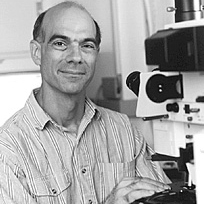
Alan O. Perantoni, Ph.D.
- Center for Cancer Research
- National Cancer Institute
- Building 560, Room 22-90A
- Frederick, MD 21702-1201
- 301-846-6529
- perantoa@mail.nih.gov
RESEARCH SUMMARY
Dr. Perantoni devoted his efforts to identifying (1) the ligands responsible for renal progenitor/stem cell survival and differentiation, (2) the molecular targets of those ligands, (3) the mechanisms responsible for the dysregulation of normal signaling in Wilms tumor, and (4) the targets of dysregulation in those tumors.
Areas of Expertise
Kidney And Reproductive Tract Development
Renal Progenitor Signaling
STAT Transcription Factors In Development And Cancer
FGF And WNT Signaling In Kidney
Wilms Tumor
Biography

NCI Scientist Emeritus
Alan O. Perantoni, Ph.D.
Dr. Perantoni received his Ph.D. in cell biology from Catholic University in 1983, having conducted his thesis research at the NCI. After serving as an assistant professor in the Pathology Department, University of Colorado Medical School, he returned to the NCI in 1992.
Dr. Perantoni retired as a Senior Investigator in 2019 and is now an NCI Scientist Emeritus.